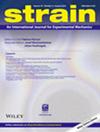High strain rate elasto‐plasticity identification using the image‐based inertial impact (IBII) test part 1: Error quantification
IF 2.4
3区 材料科学
Q2 MATERIALS SCIENCE, CHARACTERIZATION & TESTING
引用次数: 4
Abstract
Current high strain rate testing procedures generally rely on the split Hopkinson bar (SHB). In order to gain accurate material data with this technique, it is necessary to assume the test sample is in a state of quasi‐static equilibrium so that inertial effects can be neglected. During the early portion of an SHB test, it is difficult to satisfy this assumption making it challenging to investigate the elastic–plastic transition for metals. With the development of ultra‐high speed imaging technology, the image‐based inertial impact (IBII) test has emerged as an alternative to the SHB. This technique uses full‐field measurements coupled with the virtual fields method to identify material properties without requiring the assumption of quasi‐static equilibrium.使用基于图像的惯性冲击(IBII)测试的高应变率弹塑性识别第1部分:误差量化
目前的高应变速率测试程序通常依赖于分离式霍普金森杆(SHB)。为了使用该技术获得准确的材料数据,有必要假设试样处于准静态平衡状态,以便忽略惯性效应。在SHB试验的早期阶段,很难满足这一假设,因此研究金属的弹塑性转变具有挑战性。随着超高速成像技术的发展,基于图像的惯性冲击(IBII)测试已成为SHB的替代方案。该技术使用全场测量和虚拟场方法来识别材料特性,而不需要假设准静态平衡。
本文章由计算机程序翻译,如有差异,请以英文原文为准。
求助全文
约1分钟内获得全文
求助全文
来源期刊

Strain
工程技术-材料科学:表征与测试
CiteScore
4.10
自引率
4.80%
发文量
27
期刊介绍:
Strain is an international journal that contains contributions from leading-edge research on the measurement of the mechanical behaviour of structures and systems. Strain only accepts contributions with sufficient novelty in the design, implementation, and/or validation of experimental methodologies to characterize materials, structures, and systems; i.e. contributions that are limited to the application of established methodologies are outside of the scope of the journal. The journal includes papers from all engineering disciplines that deal with material behaviour and degradation under load, structural design and measurement techniques. Although the thrust of the journal is experimental, numerical simulations and validation are included in the coverage.
Strain welcomes papers that deal with novel work in the following areas:
experimental techniques
non-destructive evaluation techniques
numerical analysis, simulation and validation
residual stress measurement techniques
design of composite structures and components
impact behaviour of materials and structures
signal and image processing
transducer and sensor design
structural health monitoring
biomechanics
extreme environment
micro- and nano-scale testing method.
 求助内容:
求助内容: 应助结果提醒方式:
应助结果提醒方式:


